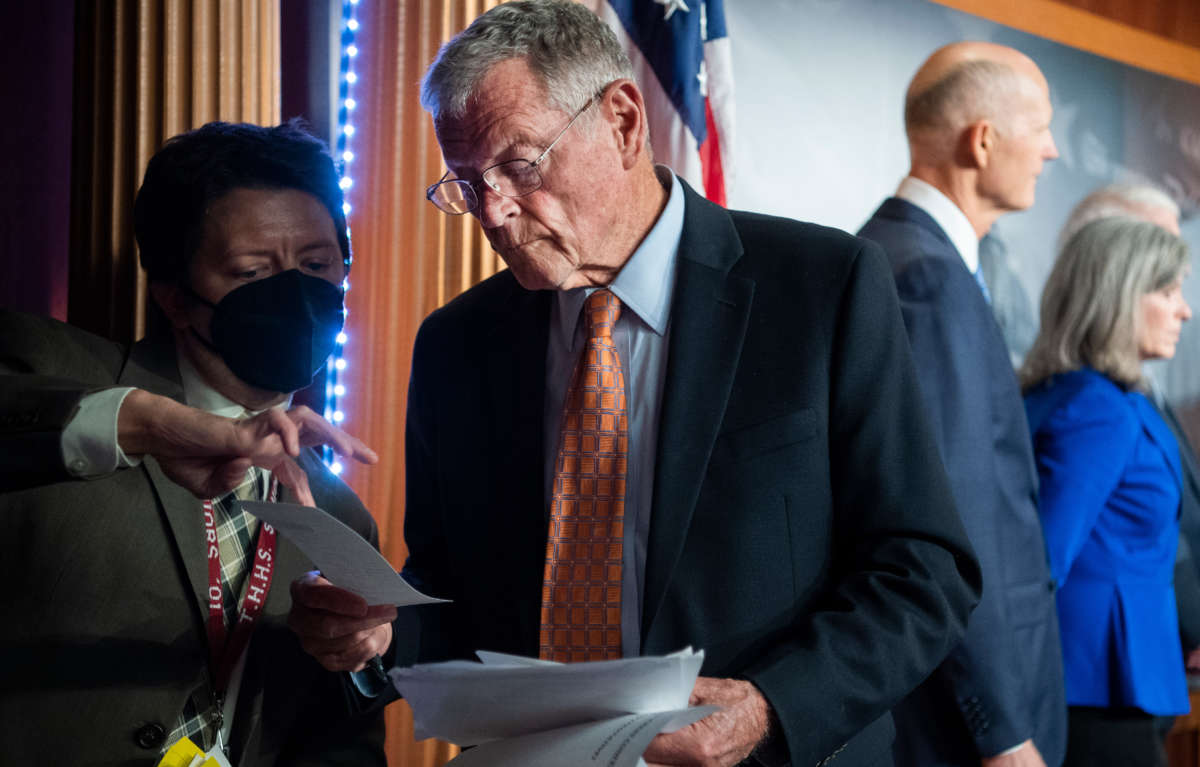While Democrats debate their Build Back Better Act that could materially improve the lives of millions of Americans, Republicans are complaining that the reconciliation bill is taking priority over what they think federal money should be used for: a bloated defense spending bill that funds an agency that has never passed an audit.
The National Defense Authorization Act is slated to cost a whopping $778 billion, five percent higher than the amount that was appropriated for defense for this fiscal year. This is a massive amount of spending that would — if held at this level over 10 years — amount to nearly 4.5 times the amount that the $1.75 trillion reconciliation bill would cost in the same amount of time. Of course, defense spending is rarely held static, and usually grows year by year.
Though the defense spending bill has been put on the back burner while Democrats continue to negotiate the reconciliation bill, there are still four weeks left on the congressional calendar and the bill will almost certainly pass on a bipartisan basis as it always does, save for some progressive objections. But even though there is no reason for the bill to be voted on immediately, that hasn’t stopped Senate Republicans from complaining about it being delayed.
In a Republican press conference on Tuesday, Sen. Jim Inhofe (R-Oklahoma), a Senate Armed Services Committee ranking member, said that “there’s not an answer” as to why the defense bill isn’t getting time on the Senate floor now. Sen. Roger Wicker (R-Mississippi) called the annual defense bill “one of the most significant pieces of legislation that we will consider this Congress.” Wicker is partially correct; the price tag of the bill is, indeed, significant. But, as progressives have pointed out, spending on defense itself is not vital and takes away from far more urgent priorities.
The fact that the GOP used this minor delay to justify calling a press conference of 13 Republican senators reveals that the party is desperately clinging to controversy while Democrats debate the reconciliation bill; Inhofe went on to call the conference a “major message” to Schumer.
In reality, lawmakers’ opposition to the bloated defense spending bill is negligible, coming only from a few progressive lawmakers. The Department of Defense is in no danger of running out of funds, especially considering that the country is supposedly no longer engaged in a war in Afghanistan for the first year in 20 years.
Instead of engaging in any critical thought or analysis as to why the defense budget is so unbelievably high, North Dakota Sen. John Thune (R) criticized Democrats for their proposals to bolster social programs and tackle the climate crisis — measures that have the potential to transform millions of Americans’ lives.
Democrats “have been so preoccupied with passing their reckless tax-and-spending spree that they have overlooked and ignored some of the basic responsibilities of governing,” said Thune. It’s ironic that Thune would complain about spending in this context — first, because of how much larger the defense budget is than the Build Back Better Act’s spending portion. The $1.75 trillion over 10 years for social programs, which is entirely offset by tax proposals, is just a small fraction of the $9.1 trillion that Congress has approved for defense over the past 10 years, adjusted for inflation.
Second, the comparison is nearly completely meaningless when it comes to what the federal dollars would do. While the reconciliation bill could go toward provisions like lowering sky-high drug prices in the U.S. and taking small steps toward addressing the climate crisis, huge portions of the defense budget go straight to private defense contractors, whose CEOs pocket millions in profits each year.
Before Midnight: Last Chance to Have Your Gift Matched!
Before midnight tonight, all donations to Truthout will be matched dollar for dollar up to $12,000! Thanks to a generous supporter, your one-time gift today will be matched immediately. As well, your monthly donation will be matched for the whole first year, doubling your impact.
We have just a few hours left to raise $12,000 and receive the full match.
This matching gift comes at a critical time. As Trump attempts to silence dissenting voices and oppositional nonprofits, reader support is our best defense against the right-wing agenda.
Help Truthout confront Trump’s fascism in 2026, and have your donation matched now!
